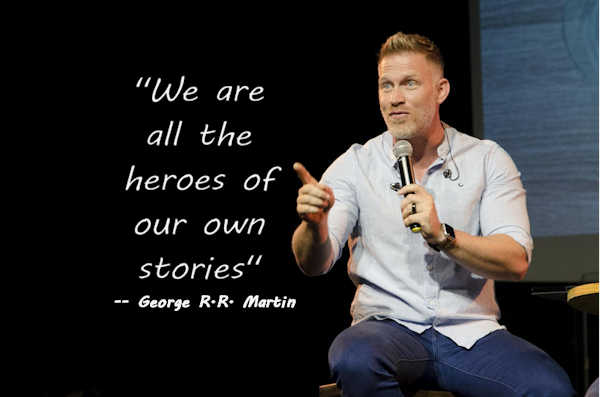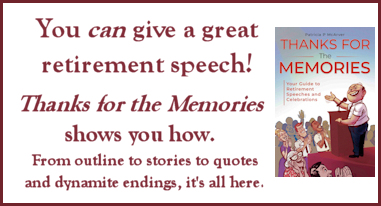A tribute speech to honor a special person
If you need to honor a special person -- whether it's a speech or a written message -- you'll need to capture why that person is memorable in just a few words. No small task, but we have some suggestions to help.
The most common tributes you hear are probably speeches given at awards ceremonies or for distinguished service. These speeches give you the chance to tell why the person has a profound impact on others.
 Photo by RapidEye, iStockphotos.com.
Speeches that make a tribute may be formal or informal but all should be well planned ahead of time.
Photo by RapidEye, iStockphotos.com.
Speeches that make a tribute may be formal or informal but all should be well planned ahead of time.Remember to edit your speech with your audience in mind so you'll be able to hold their attention.
Key questions in planning your tribute to honor a special person

- Who is my audience and what is their relationship to the honoree?
- In general terms, what has the honoree done for these people or this place?
- What one instance or situation describes what this person has done for others?
- What does the audience need to know about this person? Consider achievements and reputation.
- What is one personal experience you have had that describes this person’s character?
- If you had to describe this person to a stranger, what would you say?
- When, if ever, did this person do something that made you laugh?
- What quote or well-known saying applies to this person?
If you can answer those eight questions, you have the outline for a classic speech.
If you want a truly special tribute, consider asking a lyrics writer to compose a song tailored to the person and the occasion.
Crafting your tribute - Include general as well as specific content
When you are making a talk that pays tribute to another person, you should include material that everybody knows and agrees on as well as stories about the person that only you or a few others know.
- General content describes what a person means to others or to an organization.
- Specific content is when you share with others some unique experiences with the honoree. Think about what lessons you have learned from watching the person in the spotlight.
Start and finish strong with good material in between
As you are putting your speech together, spend time thinking about how you will open and close your speech. These segments are critical to keeping your audience engaged and being able to understand why the person being honored is important to you.
Plan your opening line carefully. You only have a few seconds to make your listeners want to pay attention to what you have to say. If someone introduces you, it's okay to say a brief Thank you. (But don't let yourself get carried away with wordiness.) Then follow with an interesting statement or fact about the person that might not be generally known. Or, start with a story of something the person did that shows what makes them special.
To see some examples of effective opening sentences, check out the honorary degree citations given by Boston University during commencement of 2018.
For other effective ways to open your speech, read more about attention-getters.
Check for transitions and pay attention to the flow. The role of transitions is to serve as a roadmap for your listeners that leads them from one point to the next. Transitions also help keep your speech from sounding choppy. For example, transitional phrases in a speech about a person who is noted for making plans might include some of these:
- While this was going on
- Meanwhile
- Always looking ahead to the next step, . . ..
- Some short phrase you repeat a time or two that fits with the tribute or the person. (That's what he said. . . There's always more to the story. . . And then comes the next big thing. . . . )
You get the idea. You should have transitions between your major points or stories.
Tell why the person deserves recognition. Be brief. You don't need to give a biography here. You just need to acknowledge the accomplishment that has brought the honoree this recognition.
Tell a story or two about the honoree. Stories are always more memorable that mere facts. And they are the best way to connect with your audience and help them apprecite the person being honored.
Get a zinger of a closing. You might tie back to your opening story or observation. Or you could repeat some phrase that you used earlier to tie your speech together.
For example, when telling a story about how Sheila kept encouraging others when the company was facing bankruptcy, you might say, "Sheila never lost faith." You could repeat that phrase in your conclusion to emphasize a special quality that sets Sheila apart.
In your conclusion, you could also finish with some all-encompassing summary of how great the honored person really is.
If you need specific ideas, check out this advice on the Six Minutes blog.
Storytelling tips
 Image by Roché Oosthuizen from Pixabay
Image by Roché Oosthuizen from PixabayStories give insight into the personality of the honoree. But here is where you need to choose your details carefully. Successful storytellers keep these tips in mind:
You don't have to start at the beginning. We tend to think about experiences in terms of beginning to ending as they are lived in real life. But retelling those experiences in a time-sequenced manner is not so interesting to the listeners. Start somewhere after the beginning and then give the necessary context.
(Remember the day the boss brought his dog into work?, We were naturally nervous about the change in leadership on that first day. Rumors had spread about how the boss was a ruthless change-agent. He started off all-business and letting us know things would be different. I think we were all anxious about our jobs. But the day I saw Bruce, that wonderful Golden, I knew things were going to be okay. . . . . )
The best stories have some element of tension. If you describe some sort of conflict, people want to listen to find out what happens.
(Many people knew we were struggling to make our goal in our third year. And headquarters said if our sales didn’t improve, we’d have to cut staff or possibly close our office. But during those dark days, Stan showed us some light. I’ll never forget his rallying cry: We make people smile! Repeated over and over. That slogan got us going. And look at where we are today! Thanks, Stan, for your faith in our product and faith in us.)
Have a clear lesson learned from your story. Tell a story about when the person showed unexpected compassion or servant leadership in a tough situation. Perhaps the person being honored serves meals in a homeless shelter or has sponsored a kid who couldn't afford a special training program he wanted. If you need a story to illustrate a particular point, check out our anecdotes for your speech page for some examples that can help.
Practice your remarks with your audience in mind
Now that you've got your speech organized, it's time to polish before you stand and deliver.
Let your own personality show. Be energetic and lively but also be comfortable with your own style. You don't want to be rigid. And you're probably not an actor or million-dollar speaker; you're a friend who knows this person well enough to say something meaningful on the special occasion. Share with others your connection with this person.
Practice. Your speech will be authentic when you know your material so well that your delivery is like a conversation -- not a rehearsed presentation. If you are using a script (but DON"T READ IT), underline your points of emphasis and put in an elipsis (. . .) in places you need to pause for effect. Those marks will remind you of timing cues so that you deliver your comments with more impact.
Common mistakes in a tribute speech
Unfortunately many of these speeches miss the mark. You've probably been to awards ceremonies, banquets honoring athletes and coaches or special event occasions where the speaker fails to keep and hold your attention during his remarks.
What are some of the most common pitfalls?
Getting bogged down in the details of a story. Too often a speaker will list so many boring details that the audience stops paying attention. You don't have to tell every twist and turn in describing what someone has done. Just pick out a few interesting nuggets. People will mentally fill in the blanks.
Focusing on the wrong people. Your speech is about the person being honored. If there are one or two important people in the audience, don't spend time gushing about how great it is for them to be present. That creates a few problems:
- First, other people in the audience don't really care.
- Second, everyone is there to honor the number-one person.
- Third, it is always risky to pay special attention to one or two in the audience because you could inevitable miss someone else who is equally deserving of attention.
Keep the main thing the main thing and focus on your honoree.
Follow these tips and your tribute will be memorable and well suited to your special occasion.
All advice on this site was written by humans. No copy was written by AI.
Please support real writers.
